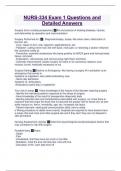NURS-334 Exam 1 Questions and
Detailed Answers
Surgery (from a safety perspective) ✅Art and science of treating diseases, injuries,
and deformities by operation and instrumentation
Surgery Performed for: ✅· Diagnosis-biopsy, scope, like colon clean, obstruction of
bronchi, etc.
· Cure- repair of ACL, tear, ligament, appendectomy, etc.
· Palliation- cutting nerve root, like with back, neck pain, or resecting a section inflamed
like ulcerative colitis pt.
· Prevention- potential mastectomy like being positive for BRCA gene and having breast
tissue, removed,
· Exploration- colonoscopy and remove polyp right them and there
· Cosmetic improvement- plastic surgery for looks or for cancerous reasons, scar
revision, burns- medically necessary vs not
Surgical Setting ✅Elective vs Emergency- like having a surgery fit in schedule vs an
emergency that comes in
Inpatient vs outpatient- also called ambulatory care
- Same day admission
Inpatient vs. Ambulatory
-Ambulatory (same day or outpatient)-
Your role in preop ✅· Have knowledge of the nature of the disorder requiring surgery
· Identify the individual patient's response to the stress of surgery
· Have knowledge of the result of preoperative diagnostic tests
· Identify potential risks and complications associated with surgery- ex: know there is
research that the longer the bone that is fractured the greater risk for blood clot- pt with
ankle fracture vs. femur, immobility, age, etc. increases risk factor
· Patient interview- need good communication skills, how to relate
o Wrong procedure is called never events, hospitals are required to have doctors have
a preop chat and mark and initial surgical site and if they don't they are not allowed to
start procedure
Nursing Assessment: (preop) ✅Determine psychological and physiological factors that
may contribute to risk with surgery
Possible fears ✅Fears:
· Death
· Pain
· Anesthesia- that they have too much or too little
· Mutilation- what the scar will look like, how will it be
· Disruption of life- can't take time off
,**Ask pt. if previous surgery if haven't they don't know what to relate it with, fear is real,
think about perception and understanding, knowledge level, what do older people do
that have a hearing deficit- shake the head yes when they don't understand, ask them to
tell you what they understand of what will happen today, if anxious or nervous info goes
over them, sometimes have a follow up call because they forget or are too nervous to
ask**
Additional nursing assessment questions ✅Additional nursing assessment: allergies
· Current medications
o Prescription and over the counter (OTC)
o Herbs
o Vitamins
o Recreational
§ Drugs
§ Alcohol
§ Tobacco
o Health Hx
o Ask them to bring it all in and be detailed with questions, St. johns' horn, vitamin E,
fish oil, garlic, known for thinning blood, inceds have anti platelet, sometimes
recommend Tylenol for inceds before procedure instead,
Health Hx (preop) ✅· Diagnosed medical conditions
· Previous surgeries and problems
· Menstrual/obstetric history
· Familial diseases/Conditions
· Reactions/problems to anesthesia (patient or family)
-Allergies (drug and non-drug)
- Tape allergy
Latex allergy
Review of systems: Cardiovascular function ✅know if Hx of HTN, MI, CHF, heart
attack, etc
Respiratory System ✅- do they have a Hx of pneumonia, upper resp infection, spasm,-
affect airway preop and post op, Increased risk for laryngospasm, bronchospasm, SOB,
chronic cough
Nervous System ✅-Evaluation of neurologic functioning, do they have deficits,
May be affected by vision or hearing loss
-Evaluation of neurological functioning, fine motor skills, gross motor skills
Urinary System ✅-make sure they can void, Hx of renal disease (for older pt do
baseline of renal test)
-Hx of frequent UTI, risk for fluid and electrolyte imbalance
, Integumentary System ✅are they at risk for skin breakdown/had issues with that?
-Risk for skin breakdown, weight, activity
Musculoskeletal System ✅- have they had Fx, Hx of osteoporosis, etc.
GI ✅hx of constipation, GI motility concerns
Endocrine System ✅If diabetic will watch blood glucose levels, are they on insulin,
Type 1 or 2 if diabetic
Immune System ✅-Compromised = Increased risk for infection, as pt. age the immune
system is less effected, worry about elderly during flu, influenza, covid, some meds can
suppress immune system
-Compromised patients have an increased risk for infection and wound healing
Fluid and Electrolyte Status ✅NPO (nothing by mouth) before surgery, shortened time
of NPO now used to be 12 nothing after midnight hours now 4-5, keep hydrated
Depending on age some may have more lab work than others,
Obesity in relation to surgery ✅Over 2/3 of US adults are overweight or obese (BMI >
25)
1/3 of adults age 20 and above are obese (BMI > 30)
Children-estimated 16.9% of children and adolescents aged 2-19 years are obese
Stresses cardiac and pulmonary systems
Can predict who will have tougher airway
Nutritional status R/T surgery
Obesity -Stresses cardiac and pulmonary systems
Predisposes to wound dehiscence and infection
Slows recovery
Adipose tissue absorbs and stores anesthesia
Preop Teaching ✅Patient has right to know what to expect and how to participate
The Joint Commission (TJC) requires a H & P on chart, legal responsibility
· Patient has right to know what to expect and how to participate
o Increases patient satisfaction
o Reduces fear, anxiety, stress, pain, vomiting
Legal Preparation ✅TJC requires this
· Each institution will have its own informed consent form
· Must include adequate disclosure of diagnosis, treatment, risks, and probability of
success
· Surgeon responsible for obtaining consent
· Nurse may obtain and witness signature
· Verify patient has understanding




